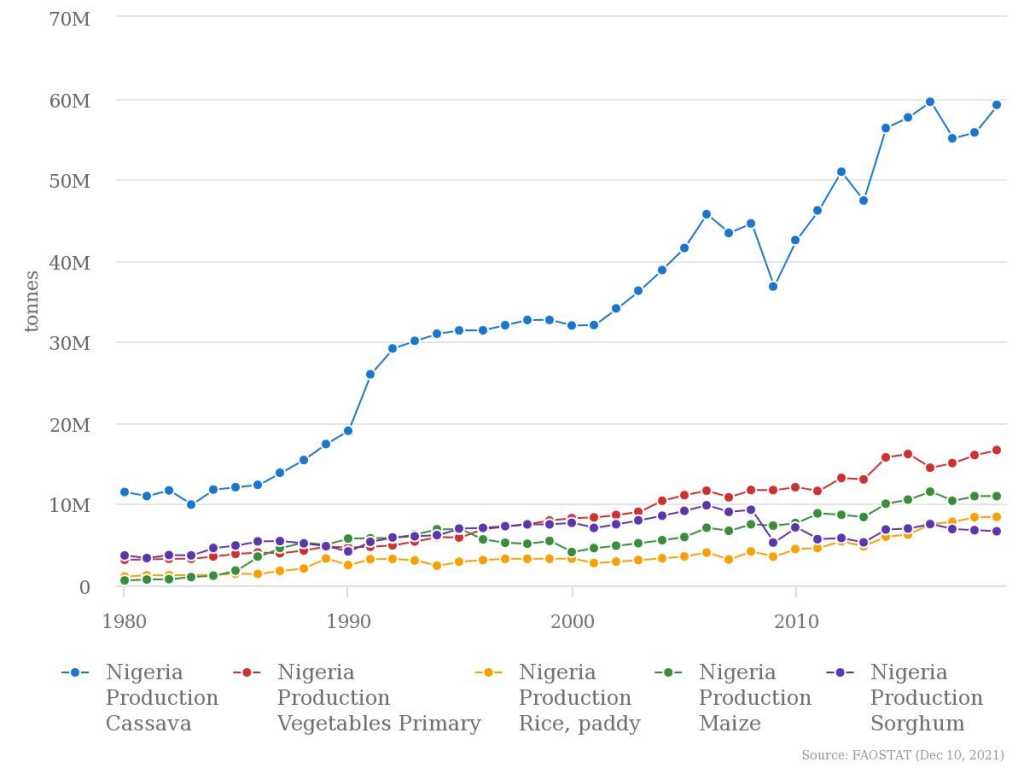A recent search of Google news for the term “climate change’ turns up a story published by the Genetic Literacy Project saying Nigeria needs to begin using biotech crops in response to climate change.
In fact, evidence shows Nigeria’s crop production is booming amidst the recent modest warming, setting records repeatedly over the past 40 years. Bio-tech crops may be useful for a variety of reasons, to enhance nutrition, to fight pests, and to improve plants hardiness in the face of various weather extremes, for example, but climate change isn’t necessitating their use in Nigeria.
A Genetic Literacy Project story titled “Nigeria needs biotechnology to weather climate change impacts on farming, say West African scientists,” cites a new book, the November 2021 Handbook of Climate Change Management (Handbook) as proving climate change is destroying crops and suppressing Nigerian crop production.
“‘Evidence of climate change on agriculture in Nigeria has since been established and increased atmospheric warmness, irregular rainfall, emergent pests, [crop] diseases…and their resultant adverse effect on agricultural productivity are glaring,” according to the Handbook. “‘This scenario poses a serious threat to food security in Nigeria and calls for the adoption of innovative biotechnologies to create resilient crops with improved adaptation to the environmental stresses occasioned by the increasing climate change.’”
The Genetic Literacy Project and the authors of the Handbook should check their premises and data. Meticulously compiled data from the he UN’s Food and Agriculture Organization, show Nigeria’s food production has set repeated records since 1980, as seen in Figure 1 below.
Figure 1. Primary crops in Nigeria, all available years. Graph created from the FAO Website. Source: http://www.fao.org/faostat/en/#compare
Rice, cassava, maize, and sorghum are four of Nigeria’s staple crops. Each have set multiple records for production over the past few decades. Between 1980 and 2019, the last year for which the FAO has records for Nigeria:
- Rice production increased by approximately 674 percent.
- Cassava production grew by slightly more than 415 percent.
- Maize production increased by a whopping 1,696 percent.
- Sorghum production grew by approximately 81 percent.
The FAO reports Nigeria also saw its vegetable production grow by approximately 428 percent between 1980 and 2019.
Biotech crops offer the promise of increased yields of cereals, grains, fruits, and vegetables that are hardier, grow more quickly with fewer inputs, use water more efficiently, resist pests better, and that contain concentrated amounts of valuable vitamins and minerals. The world, not just Nigeria, can expect to benefit from developments in the field of genetically modified crops, regardless of any changes in the climate.
What is clear from the evidence, however, is that climate change is not driving any need in Nigeria to adopt bio-tech crops. Nigeria’s agricultural sector has done just fine as the earth has modestly warmed.



















